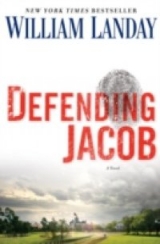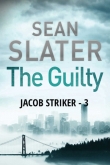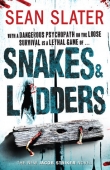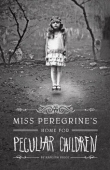
Текст книги "Defending Jacob"
Автор книги: William Landay
Соавторы: William Landay
Жанр:
Криминальные детективы
сообщить о нарушении
Текущая страница: 1 (всего у книги 25 страниц)
William Landay
Defending Jacob
Part ONE
“Let us be practical in our expectations of the Criminal Law… [For] we have merely to imagine, by some trick of time travel, meeting our earliest hominid ancestor, Adam, a proto-man, short of stature, luxuriantly furred, newly bipedal, foraging about on the African savannah three million or so years ago. Now, let us agree that we may pronounce whatever laws we like for this clever little creature, still it would be unwise to pet him.”
– Reynard Thompson, A General Theory of Human Violence (1921)
1
In the Grand Jury
Mr. Logiudice: State your name, please.
Witness: Andrew Barber.
Mr. Logiudice: What do you do for work, Mr. Barber?
Witness: I was an assistant district attorney in this county for 22 years.
Mr. Logiudice: “Was.” What do you do for work now?
Witness: I suppose you’d say I’m unemployed.
In April 2008, Neal Logiudice finally subpoenaed me to appear before the grand jury. By then it was too late. Too late for his case, certainly, but also too late for Logiudice. His reputation was already damaged beyond repair, and his career along with it. A prosecutor can limp along with a damaged reputation for a while, but his colleagues will watch him like wolves and eventually he will be forced out, for the good of the pack. I have seen it many times: an ADA is irreplaceable one day, forgotten the next.
I have always had a soft spot for Neal Logiudice (pronounced la-JOO-dis). He came to the DA’s office a dozen years before this, right out of law school. He was twenty-nine then, short, with thinning hair and a little potbelly. His mouth was overstuffed with teeth; he had to force it shut, like a full suitcase, which left him with a sour, pucker-mouthed expression. I used to get after him not to make this face in front of juries-nobody likes a scold-but he did it unconsciously. He would get up in front of the jury box shaking his head and pursing his lips like a schoolmarm or a priest, and in every juror there stirred a secret desire to vote against him. Inside the office, Logiudice was a bit of an operator and a kiss-ass. He got a lot of teasing. Other ADAs tooled on him endlessly, but he got it from everyone, even people who worked with the office at arm’s length-cops, clerks, secretaries, people who did not usually make their contempt for a prosecutor quite so obvious. They called him Milhouse, after a dweeby character on The Simpsons, and they came up with a thousand variations on his name: LoFoolish, LoDoofus, Sid Vicious, Judicious, on and on. But to me, Logiudice was okay. He was just innocent. With the best intentions, he smashed people’s lives and never lost a minute of sleep over it. He only went after bad guys, after all. That is the Prosecutor’s Fallacy– They are bad guys because I am prosecuting them – and Logiudice was not the first to be fooled by it, so I forgave him for being righteous. I even liked him. I rooted for him precisely because of his oddities, the unpronounceable name, the snaggled teeth-which any of his peers would have had straightened with expensive braces, paid for by Mummy and Daddy-even his naked ambition. I saw something in the guy. An air of sturdiness in the way he bore up under so much rejection, how he just took it and took it. He was obviously a working-class kid determined to get for himself what so many others had simply been handed. In that way, and only in that way, I suppose, he was just like me.
Now, a dozen years after he arrived in the office, despite all his quirks, he had made it, or nearly made it. Neal Logiudice was First Assistant, the number two man in the Middlesex District Attorney’s Office, the DA’s right hand and chief trial attorney. He took over the job from me-this kid who once said to me, “Andy, you’re exactly what I want to be someday.” I should have seen it coming.
In the grand jury room that morning, the jurors were in a sullen, defeated mood. They sat, thirty-odd men and women who had not been clever enough to find a way out of serving, all crammed into those school chairs with teardrop-shaped desks for chair arms. They understood their jobs well enough by now. Grand juries serve for months, and they figure out pretty quickly what the gig is all about: accuse, point your finger, name the wicked one.
A grand jury proceeding is not a trial. There is no judge in the room and no defense lawyer. The prosecutor runs the show. It is an investigation and in theory a check on the prosecutor’s power, since the grand jury decides whether the prosecutor has enough evidence to haul a suspect into court for trial. If there is enough evidence, the grand jury grants the prosecutor an indictment, his ticket to Superior Court. If not, they return a “no bill” and the case is over before it begins. In practice, no bills are rare. Most grand juries indict. Why not? They only see one side of the case.
But in this case, I suspect the jurors knew Logiudice did not have a case. Not today. The truth was not going to be found, not with evidence this stale and tainted, not after everything that had happened. It had been over a year already-over twelve months since the body of a fourteen-year-old boy was found in the woods with three stab wounds arranged in a line across the chest as if he’d been forked with a trident. But it was not the time, so much. It was everything else. Too late, and the grand jury knew it.
I knew it too.
Only Logiudice was undeterred. He pursed his lips in that odd way of his. He reviewed his notes on a yellow legal pad, considered his next question. He was doing just what I’d taught him. The voice in his head was mine: Never mind how weak your case is. Stick to the system. Play the game the same way it’s been played the last five-hundred-odd years, use the same gutter tactic that has always governed cross-examination-lure, trap, fuck.
He said, “Do you recall when you first heard about the Rifkin boy’s murder?”
“Yes.”
“Describe it.”
“I got a call, I think, first from CPAC-that’s the state police. Then two more came in right away, one from the Newton police, one from the duty DA. I may have the order wrong, but basically the phone started ringing off the hook.”
“When was this?”
“Thursday, April 12, 2007, around nine A.M., right after the body was discovered.”
“Why were you called?”
“I was the First Assistant. I was notified of every murder in the county. It was standard procedure.”
“But you did not keep every case, did you? You did not personally investigate and try every homicide that came in?”
“No, of course not. I didn’t have that kind of time. I kept very few homicides. Most I assigned to other ADAs.”
“But this one you kept.”
“Yes.”
“Did you decide immediately that you were going to keep it for yourself, or did you only decide that later?”
“I decided almost immediately.”
“Why? Why did you want this case in particular?”
“I had an understanding with the district attorney, Lynn Canavan: certain cases I would try personally.”
“What sort of cases?”
“High-priority cases.”
“Why you?”
“I was the senior trial lawyer in the office. She wanted to be sure that important cases were handled properly.”
“Who decided if a case was high priority?”
“Me, in the first instance. In consultation with the district attorney, of course, but things tend to move pretty fast at the beginning. There isn’t usually time for a meeting.”
“So you decided the Rifkin murder was a high-priority case?”
“Of course.”
“Why?”
“Because it involved the murder of a child. I think we also had an idea it might blow up, catch the media’s attention. It was that kind of case. It happened in a wealthy town, with a wealthy victim. We’d already had a few cases like that. At the beginning we did not know exactly what it was, either. In some ways it looked like a schoolhouse killing, a Columbine thing. Basically, we didn’t know what the hell it was, but it smelled like a big case. If it had turned out to be a smaller thing, I would have passed it off later, but in those first few hours I had to be sure everything was done right.”
“Did you inform the district attorney that you had a conflict of interest?”
“No.”
“Why not?”
“Because I didn’t have one.”
“Wasn’t your son, Jacob, a classmate of the dead boy?”
“Yes, but I didn’t know the victim. Jacob didn’t know him either, as far as I was aware. I’d never even heard the dead boy’s name.”
“You did not know the kid. All right. But you did know that he and your son were in the same grade at the same middle school in the same town?”
“Yes.”
“And you still didn’t think you were conflicted out? You didn’t think your objectivity might be called into question?”
“No. Of course not.”
“Even in hindsight? You insist, you– Even in hindsight, you still don’t feel the circumstances gave even the appearance of a conflict?”
“No, there was nothing improper about it. There was nothing even unusual about it. The fact that I lived in the town where the murder happened? That was a good thing. In smaller counties, the prosecutor often lives in the community where a crime happens, he often knows the people affected by it. So what? So he wants to catch the murderer even more? That’s not a conflict of interest. Look, the bottom line is, I have a conflict with all murderers. That’s my job. This was a horrible, horrible crime; it was my job to do something about it. I was determined to do just that.”
“Okay.” Logiudice lowered his eyes to his pad. No sense attacking the witness so early in his testimony. He would come back to this point later in the day, no doubt, when I was tired. For now, best to keep the temperature down.
“You understand your Fifth Amendment rights?”
“Of course.”
“And you have waived them?”
“Apparently. I’m here. I’m talking.”
Titters from the grand jury.
Logiudice laid down his pad, and with it he seemed to set aside his game plan for a moment. “Mr. Barber-Andy-could I just ask you something: why not invoke them? Why not remain silent?” The next sentence he left unsaid: That’s what I would do.
I thought for a moment that this was a tactic, a bit of playacting. But Logiudice seemed to mean it. He was worried I was up to something. He did not want to be tricked, to look like a fool.
I said, “I have no desire to remain silent. I want the truth to come out.”
“No matter what?”
“I believe in the system, same as you, same as everyone here.”
Now, this was not exactly true. I do not believe in the court system, at least I do not think it is especially good at finding the truth. No lawyer does. We have all seen too many mistakes, too many bad results. A jury verdict is just a guess-a well-intentioned guess, generally, but you simply cannot tell fact from fiction by taking a vote. And yet, despite all that, I do believe in the power of the ritual. I believe in the religious symbolism, the black robes, the marble-columned courthouses like Greek temples. When we hold a trial, we are saying a mass. We are praying together to do what is right and to be protected from danger, and that is worth doing whether or not our prayers are actually heard.
Of course, Logiudice did not go in for that sort of solemn bullshit. He lived in the lawyer’s binary world, guilty or not guilty, and he was determined to keep me pinned there.
“You believe in the system, do you?” he sniffed. “All right, Andy, let’s get back to it, then. We’ll let the system do its work.” He gave the jury a knowing, smart-ass look.
Attaboy, Neal. Don’t let the witness jump into bed with the jury– you jump into bed with the jury. Jump in there and snuggle right up beside them under the blanket and leave the witness out in the cold. I smirked. I would have stood up and applauded if I’d been allowed to, because I taught him to do precisely this. Why deny myself a little fatherly pride? I must not have been all bad-I turned Neal Logiudice into a half-decent lawyer, after all.
“So go on already,” I said, nuzzling the jury’s neck. “Stop screwing around and get on with it, Neal.”
He gave me a look, then picked up his yellow pad again and scanned it, looking for his place. I could practically read the thought spelled out across his forehead: lure, trap, fuck. “Okay,” he said, “let’s pick it up at the aftermath of the murder.”
2
Our Crowd
April 2007: twelve months earlier.
W hen the Rifkins opened their home for the shiva, the Jewish period of mourning, it seemed the whole town came. The family would not be allowed to mourn in private. The boy’s murder was a public event; the grieving would be as well. The house was so full that when the murmur of conversation occasionally swelled, the whole thing began to feel awkwardly like a party, until the crowd lowered its voice as one, as if an invisible volume knob were being turned.
I made apologetic faces as I moved through this crowd, repeating “Excuse me,” turning this way and that to shuffle by.
People stared with curious expressions. Someone said, “That’s him, that’s Andy Barber,” but I did not stop. We were four days past the murder now, and everyone knew I was handling the case. They wanted to ask about it, naturally, about suspects and clues and all that, but they did not dare. For the moment, the details of the investigation did not matter, only the raw fact that an innocent kid was dead.
Murdered! The news sucker-punched them. Newton had no crime to speak of. What the locals knew about violence necessarily came from news reports and TV shows. They had supposed that violent crime was limited to the city, to an underclass of urban hillbillies. They were wrong about that, of course, but they were not fools and they would not have been so shocked by the murder of an adult. What made the Rifkin murder so profane was that it involved one of the town’s children. It was a violation of Newton’s self-image. For a while a sign had stood in Newton Centre declaring the place “A Community of Families, A Family of Communities,” and you often heard it repeated that Newton was “a good place to raise kids.” Which indeed it was. It brimmed with test-prep centers and after-school tutors, karate dojos and Saturday soccer leagues. The town’s young parents especially prized this idea of Newton as a child’s paradise. Many of them had left the hip, sophisticated city to move here. They had accepted massive expenses, stultifying monotony, and the queasy disappointment of settling for a conventional life. To these ambivalent residents, the whole suburban project made sense only because it was “a good place to raise kids.” They had staked everything on it.
Moving from room to room, I passed one tribe after another. The kids, the dead boy’s friends, had crowded into a small den at the front of the house. They talked softly, stared. One girl’s mascara was smeared with tears. My own son, Jacob, sat in a low chair, lank and gangly, apart from the others. He gazed into his cell phone screen, uninterested in the conversations around him.
The grief-stunned family was next door in the living room, old grandmas, baby cousins.
In the kitchen, finally, were the parents of the kids who’d gone through the Newton schools with Ben Rifkin. This was our crowd. We had known one another since our kids showed up for the first day of kindergarten eight years earlier. We had stood together at a thousand morning drop-offs and afternoon pickups, endless soccer games and school fund-raisers and one memorable production of Twelve Angry Men. Still, a few close friendships aside, we did not know one another all that well. There was a camaraderie among us, certainly, but no real connection. Most of these acquaintanceships would not survive our kids’ graduation from high school. But in those first few days after Ben Rifkin’s murder, we felt an illusion of closeness. It was as if we had all suddenly been revealed to one another.
In the Rifkins’ vast kitchen-Wolf cooktop, Sub-Zero fridge, granite counters, English-white cabinets-the school parents huddled in clusters of three or four and made intimate confessions about insomnia, sadness, unshakeable dread. They talked over and over about Columbine and 9/11 and how Ben’s death made them cling to their own children while they could. The extravagant emotions of that evening were heightened by the warm light in the kitchen, cast by hanging fixtures with burnt-orange globes. In that firelight, as I entered the room, the parents were indulging one another in the luxury of confessing secrets.
At the kitchen island one of the moms, Toby Lanzman, was arranging hors d’oeuvres on a serving platter as I came into the room. A dish towel was slung over her shoulder. The sinews in her forearms stood out as she worked. Toby was my wife Laurie’s best friend, one of the few enduring connections we had made here. She saw me searching for my wife, and she pointed across the room.
“She’s mothering the mothers,” Toby said.
“I see that.”
“Well, we can all use a little mothering at the moment.”
I grunted, gave her a puzzled look, and moved off. Toby was an incitement. My only defense against her was a tactical retreat.
Laurie stood with a small circle of moms. Her hair, which has always been thick and unruly, was swept up in a loose bun at the back of her head and held there by a big tortoiseshell hair clip. She rubbed a friend’s upper arm in a consoling way. Her friend inclined toward Laurie visibly, like a cat being stroked.
When I reached her, Laurie put her left arm around my waist. “Hi, sweetie.”
“It’s time to go.”
“Andy, you’ve been saying that since the second we got here.”
“Not true. I’ve been thinking it, not saying it.”
“Well, it’s been written all over your face.” She sighed. “I knew we should have come in separate cars.”
She took a moment to appraise me. She did not want to go but understood that I was uneasy, that I felt spotlighted here, that I was not much of a talker to begin with-chitchat in crowded rooms always left me exhausted-and these things all had to be weighed. A family had to be managed, like any other organization.
“You go,” she decided. “I’ll get a ride home with Toby.”
“Yeah?”
“Yeah. Why not? Take Jacob with you.”
“You’re sure?” I leaned down-Laurie is almost a foot shorter than me-to stage-whisper, “Because I’d love to stay.”
She laughed. “Go. Before I change my mind.”
The funereal women stared.
“Go on. Your coat’s in the bedroom upstairs.”
I went upstairs and found myself in a long corridor. The noise was muted here, which came as a relief. The echo of the crowd still murmured in my ears. I began searching for the coats. In one bedroom, which apparently belonged to the dead boy’s little sister, there was a pile of coats on the bed, but mine was not in the pile.
The door to the next room was closed. I knocked, opened it, poked my head in to peek around.
The room was gloomy. The only light came from a brass floor lamp in the far corner. The dead boy’s father sat in a wing chair under this light. Dan Rifkin was small, trim, delicate. As always, his hair was sprayed in place. He wore an expensive-looking dark suit. There was a rough two-inch tear in his lapel to symbolize his broken heart-a waste of an expensive suit, I thought. In the dim light, his eyes were sunken, rimmed in bluish circles like a raccoon’s eye-mask.
“Hello, Andy,” he said.
“Sorry. Just looking for my coat. Didn’t mean to bother you.”
“No, come sit a minute.”
“Nah. I don’t want to intrude.”
“Please, sit, sit. There’s something I want to ask you.”
My heart sank. I have seen the writhing of survivors of murder victims. My job forces me to watch it. Parents of murdered children have it worst, and to me the fathers have it even worse than the mothers because they are taught to be stoic, to “act like a man.” Studies have shown that fathers of murdered children often die within a few years of the murder, often of heart failure. Really, they die of grief. At some point a prosecutor realizes he cannot survive that kind of heartbreak either. He cannot follow the fathers down. So he focuses instead on the technical aspects of the job. He turns it into a craft like any other. The trick is to keep the suffering at a distance.
But Dan Rifkin insisted. He waved his arm like a cop directing cars to move ahead, and seeing there was no choice, I closed the door gently and took the chair next to his.
“Drink?” He held up a tumbler of coppery whiskey, neat.
“No.”
“Is there any news, Andy?”
“No. Afraid not.”
He nodded, looked off toward the corner of the room, disappointed. “I’ve always loved this room. This is where I come to think. When something like this happens, you spend a lot of time thinking.” He made a tight little smile: Don’t worry, I’m all right.
“I’m sure that’s true.”
“The thing I can’t get past is: why did this guy do it?”
“Dan, you really shouldn’t-”
“No, hear me out. Just-I don’t-I don’t need hand-holding. I’m a rational person, that’s all. I have questions. Not about the details. When we’ve talked, you and I, it’s always about the details: the evidence, the court procedures. But I’m a rational person, okay? I’m a rational person and I have questions. Other questions.”
I sank in my seat, felt my shoulders relax, acquiescing.
“Okay. So here it is: Ben was so good. That’s the first thing. Of course no kid deserves this, anyway. I know that. But Ben really was a good boy. He was so good. And just a kid. He was fourteen years old, for God’s sake! Never made any trouble. Never. Never, never, never. So why? What was the motive? I don’t mean anger, greed, jealousy, that kind of motive, because there can’t be an ordinary motive in this case, there can’t, it just doesn’t make sense. Who could feel that kind of, of rage against Ben, against any little kid? It just doesn’t make sense. It just doesn’t make sense.” Rifkin put the four fingertips of his right hand on his forehead and worked the skin in slow circles. “What I mean is: what separates these people? Because I’ve felt those things, of course, those motives – angry, greedy, jealous-you’ve felt them, everybody’s felt them. But we’ve never killed anyone. You see? We never could kill anyone. But some people do, some people can. Why is that?”
“I don’t know.”
“You must have some sense of these things.”
“No. I don’t, really.”
“But you talk to them, you meet them. What do they say, the killers?”
“They don’t talk much, most of them.”
“Do you ever ask? Not why they did it, but what makes them capable of it in the first place.”
“No.”
“Why not?”
“Because they wouldn’t answer. Their lawyers wouldn’t let them answer.”
“Lawyers!” He tossed his hand.
“They wouldn’t know how to answer, anyway, most of them. These philosophical murderers-Chianti and fava beans and all that stuff-it’s bullshit. It’s just the movies. Anyway, they’re full of shit, these guys. If they had to answer, they’d probably tell you about their rough childhoods or something. They’d make themselves the victims. That’s the usual story.”
He nodded once, to urge me on.
“Dan, the thing is, you can’t torture yourself looking for reasons. There are none. It’s not logical. Not the part you’re talking about.”
Rifkin slid down in his chair a little, concentrating, as if he would need to give the whole thing more thought. His eyes glistened but his voice was even, controlled. “Do other parents ask these sorts of things?”
“They ask all kinds of things.”
“Do you see them after the case is over? The parents?”
“Sometimes.”
“I mean long after, years.”
“Sometimes.”
“And do they-how do they seem? Are they all right?”
“Some of them are all right.”
“But some of them aren’t.”
“Some of them aren’t.”
“What do they do, the ones who make it? What are the key things? There must be a pattern. What’s the strategy, what are the best practices? What’s worked for them?”
“They get help. They rely on their families, the people around them. There are groups out there for survivors; they use those. We can put you in touch. You should talk to the victim advocate. She’ll set you up with a support group. It’s very helpful. You can’t do it alone, that’s the thing. You have to remember there are other people out there who have gone through it, who know what you’re going through.”
“And the other ones, the parents who don’t make it, what happens to them? The ones who never recover?”
“You’re not going to be one of those.”
“But if I am? What happens to me, to us?”
“We’re not going to let that happen. We’re not even going to think that way.”
“But it does happen. It does happen, doesn’t it? It does.”
“Not to you. Ben wouldn’t want it to happen to you.”
Silence.
“I know your son,” Rifkin said. “Jacob.”
“Yes.”
“I’ve seen him around the school. He seems like a good kid. Big handsome boy. You must be proud.”
“I am.”
“He looks like you, I think.”
“Yeah, I’ve been told.”
He took a deep breath. “You know, I find myself thinking about these kids from Ben’s class. I feel attached. I want to see them succeed, you know? I’ve watched them grow up, I feel close to them. Is that unusual? Am I feeling that because it makes me feel closer to Ben? Is that why I’m latching onto these other kids? Because that’s what it sounds like, doesn’t it? It looks weird.”
“Dan, don’t worry about how things look. People are going to think whatever they think. The hell with ’em. You can’t worry about it.”
He massaged his forehead some more. His agony could not have been more obvious if he had been bleeding on the floor. I wanted to help him. At the same time, I wanted to get away from him.
“It would help me if I knew, if, if the case was resolved. It will help me when you resolve the case. Because the uncertainty-it’s draining. It’ll help when the case is resolved, won’t it? In other cases you’ve seen, that helps the parents, doesn’t it?”
“Yes, I think so.”
“I don’t mean to pressure you. I don’t mean to sound that way. It’s just, I think it will help me when the case is resolved and I know this guy is-when he’s locked up and put away. I know you’ll do that. I have faith in you, of course. I mean, of course. I’m not doubting you, Andy. I’m just saying it will help me. Me, my wife, everyone. That’s what we need, I think. Closure. That’s what we’re looking to you for.”
That night Laurie and I lay in bed reading.
“I still think they’re making a mistake opening the school so soon.”
“Laurie, we’ve been all through this.” My voice had a bored tone. Been there, done that. “Jacob will be perfectly safe. We’ll take him there ourselves, we’ll walk him right up to the door. There’ll be cops all over. He’ll be safer in school than anywhere else.”
“Safer. You can’t know that. How could you know that? Nobody has any idea who this guy is or where he is or what he intends to do next.”
“They have to open the school sometime. Life goes on.”
“You’re wrong, Andy.”
“How long do you want them to wait?”
“Until they catch the guy.”
“That could take a while.”
“So? What’s the worst that could happen? The kids miss a few days of school. So what? At least they’d be safe.”
“You can’t make them totally safe. It’s a big world out there. Big, dangerous world.”
“Okay, safer.”
I laid my book down on my belly, where it formed a little roof. “Laurie, if you keep the school closed, you send these kids the wrong message. School isn’t supposed to be dangerous. It’s not a place they should be afraid of. It’s their second home. It’s where they spend most of their waking hours. They want to be there. They want to be with their friends, not stuck at home, hiding under the bed so the bogeyman doesn’t get them.”
“The bogeyman already got one of them. That makes him not a bogeyman.”
“Okay, but you see what I’m saying.”
“Oh, I see what you’re saying, Andy. I’m just telling you you’re wrong. The number one priority is keeping the kids safe, physically. Then they can go be with their friends or whatever. Until they catch the guy, you can’t promise me the kids’ll be safe.”
“You need a guarantee?”
“Yes.”
“We’ll catch the guy,” I said. “I guarantee it.”
“When?”
“Soon.”
“You know this?”
“I expect it. We always catch ’em.”
“Not always. Remember the guy who killed his wife and wrapped her in a blanket in the back of the Saab?”
“We did catch that guy. We just couldn’t-all right, almost always. We almost always catch ’em. This guy we’ll catch, I promise you.”
“What if you’re wrong?”
“If I’m wrong, I’m sure you’ll tell me all about it.”
“No, I mean if you’re wrong and some poor kid gets hurt?”
“That won’t happen, Laurie.”
She frowned, giving up. “There’s no arguing with you. It’s like running into a wall over and over again.”
“We’re not arguing. We’re discussing.”
“You’re a lawyer; you don’t know the difference. I’m arguing.”
“Look, what do you want me to say, Laurie?”
“I don’t want you to say anything. I want you to listen. You know, being confident isn’t the same as being right. Think. We might be putting our son in danger.” She pressed her fingertip to my temple and shoved it, a gesture half playful, half pissed off. “Think.”
She turned away, laid her book atop a wobbly pile of others on her night table, and lay down with her back to me, curled up, a kid in an adult body.
“Here,” I said, “scootch over.”
With a series of body hops, she moved backward until her back was against me. Until she could feel some warmth or sturdiness or whatever she needed from me at that moment. I rubbed her upper arm.
“It’s going to be all right.”
She grunted.
I said, “I suppose make-up sex is out of the question?”
“I thought we weren’t arguing.”
“I wasn’t, but you were. And I want you to know: it’s okay, I forgive you.”
“Ha, ha. Maybe if you say you’re sorry.”
“I’m sorry.”
“You don’t sound sorry.”
“I am truly, deeply sorry. Truly.”
“Now say you’re wrong.”
“Wrong?”
“Say you’re wrong. Do you want it or not?”
“Hm. So, just to be clear: all I have to do is say I’m wrong and a beautiful woman will make passionate love to me.”
“I didn’t say passionate. Just regular.”
“Okay, so: say I’m wrong and a beautiful woman will make love to me, completely without passion but with pretty good technique. That’s the situation?”
“Pretty good technique?”
“Astounding technique.”
“Yes, Counselor, that’s the situation.”
I put away my book, McCullough’s biography of Truman, atop a slippery pile of slick magazines on my own night table, and turned off the light. “Forget it. I’m not wrong.”








